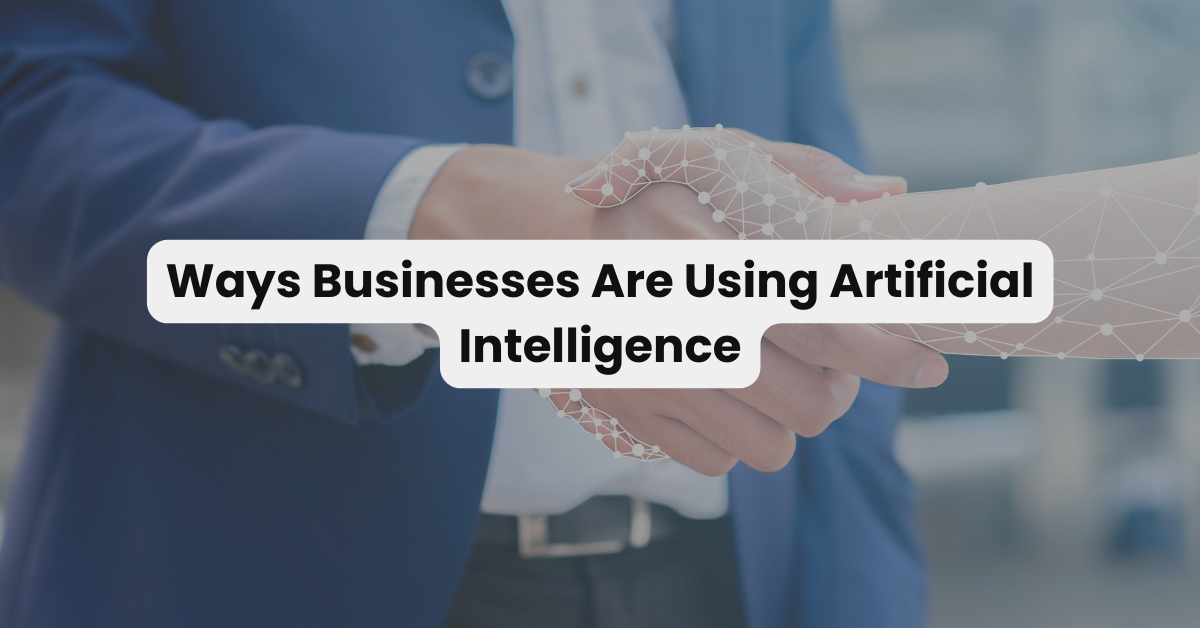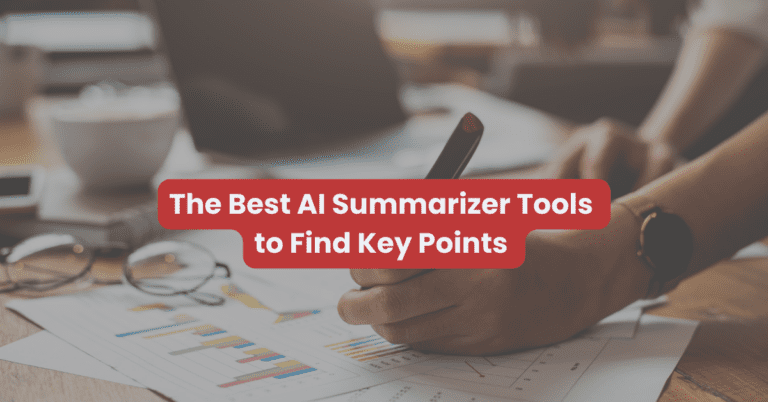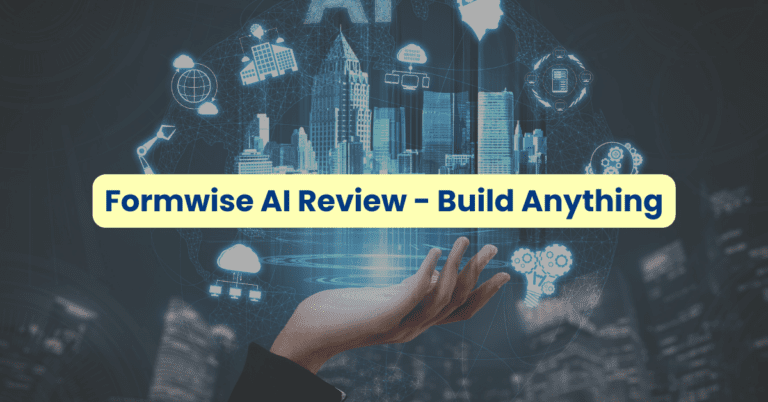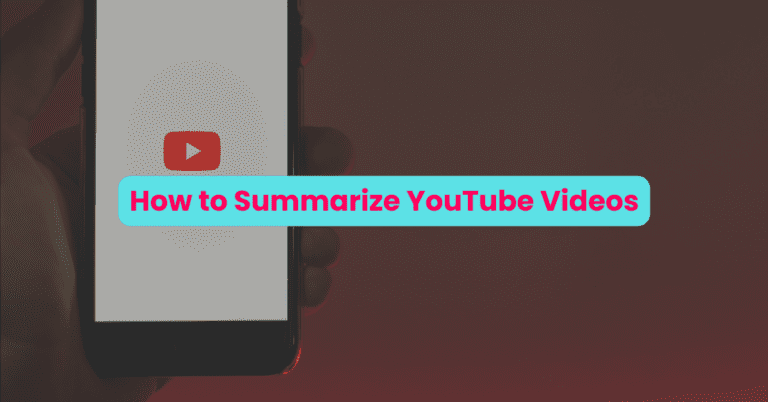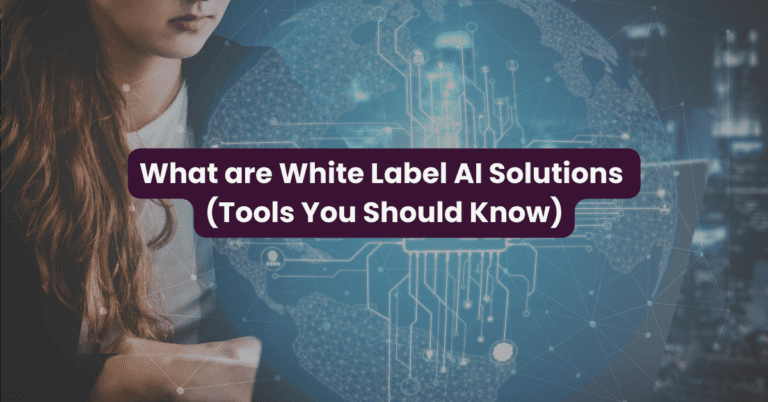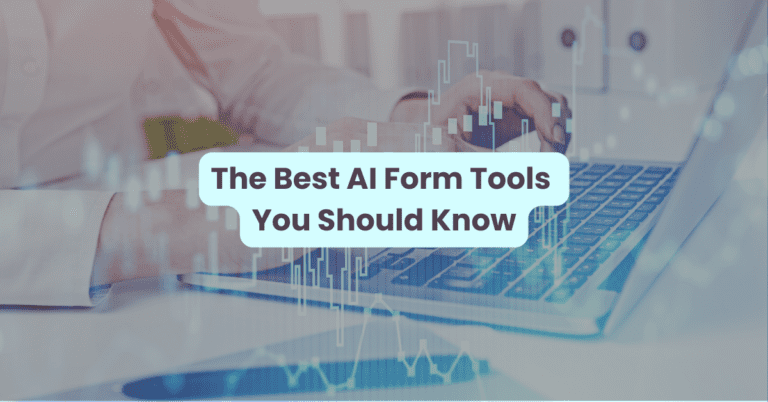Ever since ChatGPT launched, AI has been the buzzword on everyone’s lips.
But as a leader, business owner, or entrepreneur, you’re likely wondering if AI is relevant to you. And if yes, then how can you use it?
In this post, I’m going to show you the practical everyday applications of AI for businesses in 2024. And we’ll go beyond content generation.
Here are different use cases of AI for businesses across multiple categories and functions.
- Content Creation
- 1. Content Writing & Text Generation
- 2. Content Editing Assistants
- 3. Video Creation and Editing
- 4. Audio Tools for Podcasts, Music, and More
- Search Engine Optimization
- 5. SEO Optimization for Blog Content
- 6. Automated SEO for Websites
- AI Marketing and Sales Use Cases
- 7. Email marketing automation
- 8. Automated Sales Funnel
- 9. AI CRM and Sales
- 10. Pay Per Click Advertising
- 11. Cold Calling Insights
- Social Media Automation
- 12. Automated social media scheduling
- 13. ‘Batching’ or Mass Creating Social Media Images
- 14. Social media mining
- Productivity and Time management
- 15. Project management
- 16. Employee Productivity and Time Tracking
- 17. AI Data Scraping and Data Mining
- 18. Automated workflow processes
- 19. Translations
- Human Resources Activities
- 20. Skill testing
- 21. Recruitment
- Customer Support
- 22. AI-powered Help Desk Platforms
- 23. Chatbots
- Branding
- 24. Business Name Generator
- 25. Logo Design
- 26. Personal Branding
- Conversion Optimization
- 27. AI-generated Landing Page Builders
- 28. Smart A/B Testing
- 29. User Experience Optimization
- 30. Targeted advertising
- 31. Automated Retargeting
- 32. Voice Search Optimization
- 33. Image Recognition Technology
- 34. AI Predictive Analytics
- eCommerce
- 35. Personalization
- 36. Search and Discovery
- 37. Segmentation
- 38. User Research and Feedback
- 39. Tool Builders – White Label GPT
- 40. AI Form Creation Tools
Content Creation
Let’s start with the most popular AI application for businesses right now: content creation.
1. Content Writing & Text Generation
AI can quickly write articles, reports, and even books that sound like humans wrote them. It can create virtually any kind of written content with the right prompts. Here are just a few things it can build for you specifically for content marketing:
- Blog posts
- Social media posts
- Newsletter content
- Cold emails
- eBooks
- Landing page content
- Product descriptions
- Resumes
- Cover letters
- Ad copy
- Job descriptions
- Generating content summaries
- Paraphrasing content with AI
And anything else you can think of. And the top tools for content writing are:
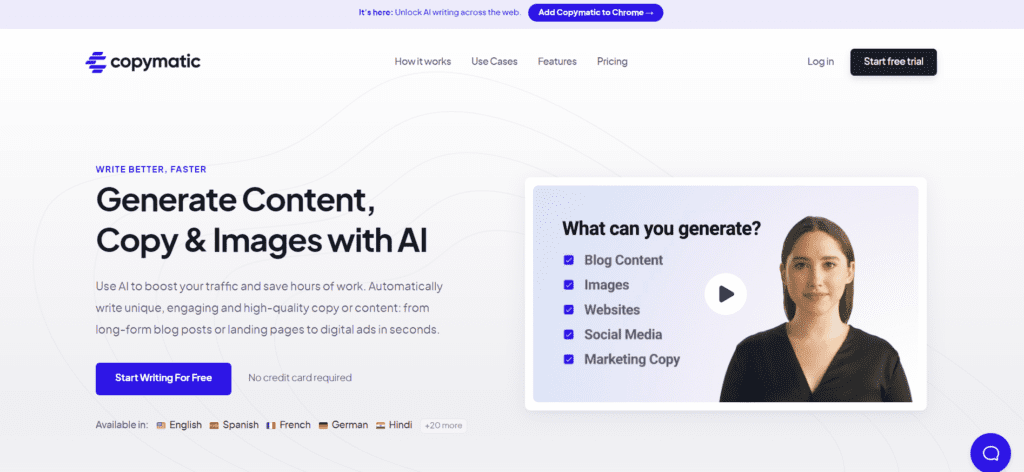

And this is just the tip of the surface. Let’s explore more content-related AI applications for businesses.
2. Content Editing Assistants
These are specialized AI tools that rephrase, rewrite, and improve existing text. This type of AI will make your content more compelling in an instant.
You can shorten, expand, rewrite, and improve your writing with a click. This is great if you want to maintain a human touch but save time on editing.
You can also summarize entire web pages, PDFs, and links with the help of such tools. Also, you can quickly paraphrase content to avoid plagiarism and repurpose your content.
The top AI content editing tools are:
- WordTune (see my Wordtune review)
- ProWritingAid
- Grammarly AI
- QuillBot
3. Video Creation and Editing
Video content is highly engaging and also incredibly hard to make. It’s also expensive, but that’s about to change with AI.
You can streamline video creation and editing with AI video tools that will:
- Generate video intros and outros
- Automatically delete clips or edit them
- Adjust sound levels and improve them, etc.
You can use AI to create realistic-looking people and talking heads with natural-sounding voices and accents.
This way, you can create whole videos for your YouTube channel, tutorials, social media, and so on.
The top video editing AI tools are:
Also, I’m including YouTube video summarizers in this list. These are tools that will generate YouTube transcripts and summarize them for the key points. Read my post on how to use a YouTube video summarizer and why you should.
4. Audio Tools for Podcasts, Music, and More
With the advances available today, you can use AI to:
- Generate voices and human-like speech
- Create music, melodies, tunes, and so on
- Convert text to speech
- Edit your voice recordings, podcasts, video sounds, and so on to remove filler sounds, background music, etc.
AI now removes the need to invest in expensive audio editing tools and services. You can improve the quality of your sounds ASAP.
Check out the following AI audio tools:
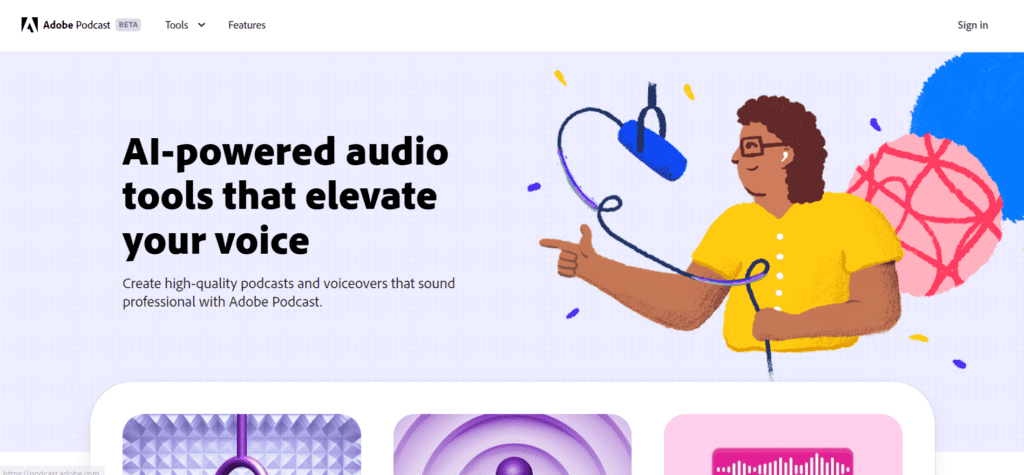

- Adobe Podcast: Make your podcasts and voiceovers studio quality
- LANDR: AI audio mastering software for musicians
- Otter AI: Transcribe words to text for your meetings
Search Engine Optimization
It’s not enough to create content; you need to make it work for search engines and people. That is, make it relevant, easy to find, and enriched with keywords. Let’s look at specific ways AI can improve your SEO efforts.
5. SEO Optimization for Blog Content
Previously, optimizing an article or blog post for specific keywords was time-consuming and needed in-depth knowledge of SEO techniques.
But, thanks to AI, businesses can now generate content that ranks with a few clicks.
The best example of this is SurferSEO’s AI content creation feature. You set a keyword and ask it to generate an entire blog post. And the tool does just that – it will generate headlines, subheadings, keywords, and their variations in the post.
You get a blog post with a high SEO score that will rank as a top-performing article with a few tweaks.
6. Automated SEO for Websites
Platforms like Alli AI allow marketing agencies to scale up their SEO and content marketing services.
It’s as simple as adding a code snippet to a client’s website and getting automated recommendations for improvements. This could be improving your site load speed and performance, adding an XML sitemap, and others.
AI Marketing and Sales Use Cases
Some incredible ways you can apply AI to marketing:
7. Email marketing automation
One of the best areas in which to apply AI is email marketing.
It’s well known that every dollar you spend in email marketing gives you 44 USD in return. That’s 4400% ROI!
Email marketing works when it is personalized and provides value to users. And AI makes this type of personalization easier. Not to mention, you’ll streamline all your email marketing efforts. Here are some amazing ways AI will make your email marketing more effective:
- Use AI-based platforms to segment your audience according to behavior, purchase history, and other factors.
- Create compelling email copy.
- Automate your drip email sequence i.e., create triggers for follow-up emails based on what readers do.
These are just a few ways your business can use AI to improve your user engagement with your newsletters and email campaigns. Let’s look at a few email marketing AI tools:
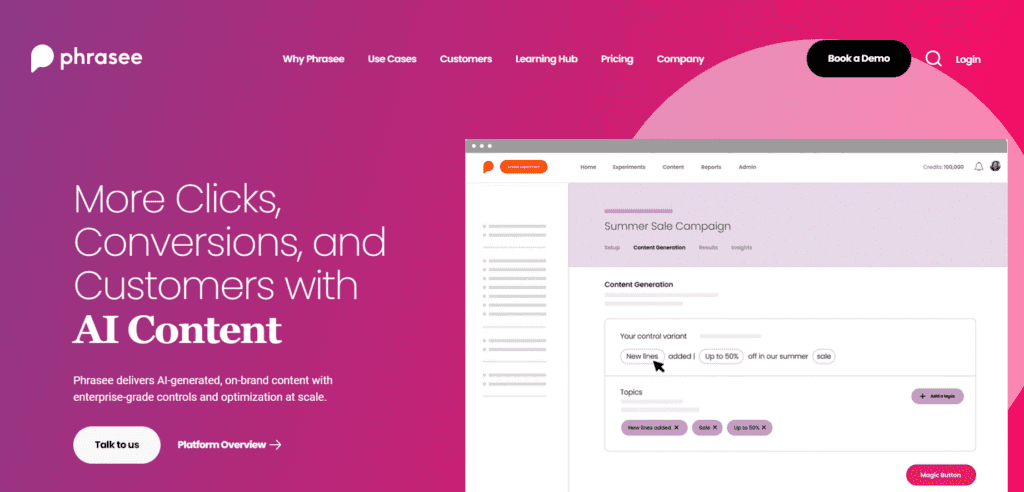

8. Automated Sales Funnel
Sales funnels can be hard to make. But today, you can give instructions in plain English, add some business details, and in no time, you get a full sales funnel to drive business.
The best AI sales funnel tools will leverage historical data and create funnels that lead to the most sales.
Some platforms that do this are:
- Appypie
- Akkio – integrates with Salesforce to get leads
- AutoFunnel
- Taskade
9. AI CRM and Sales
Knowing your audience is the key to sales success. And Customer Relationship Management (CRM) platforms are staples of any marketing toolkit to let you personalize your sales and marketing.
With AI, it’s possible to:
- Generate reports and get powerful insights to improve your marketing campaigns
- Integrate content generation with CRM activities
- Classify your content effectively
- Enrich your data
- Automate boring and tedious tasks
- Ask AI to extract specific data from your CRM easily
There’s a lot more that you can do with AI-integrated CRM. And a lot depends on which platforms you work with. Here are the top AI-based CRM platforms:
- People.ai
- ChatSpot by HubSpot
- Zia by Zoho CRM
- Einstein GPT by Salesforce
With AI tools for sales and CRM, you can improve personalization and close sales faster.
10. Pay Per Click Advertising
If you’ve run ads via Google, Facebook, or other platforms, then you know how expensive it can get.
Fortunately, the right AI tools can help you optimize your PPC campaigns and get better results.
Here are some ways to use AI to optimize PPC campaigns:
- Automated reporting on your campaigns on various platforms. Learn which ad campaigns are doing well and get insights to boost conversion rates.
- Keyword research to pick relevant keywords with optimal search volume and competition.
- Automate scripts to finely control your ad campaigns.
- Optimize and generate product titles and descriptions for ads on products.
- Test your ads.
- Find and target the right audience.
There are different types of tools to improve your PPC results. Some focus on marketing reports and some are comprehensive and manage everything around your ad campaigns.
Check out WordStream, Optmyzr, Swydo, and other platforms.
11. Cold Calling Insights
When done well, cold calling can lead to big-ticket sales. However, managing contacts, learning from each call, and improving cold calls is tedious.
But AI can help improve cold calling.
AI tools like Salesmen can automatically detect the sentiment in each call, suggest upsells and cross-sells, recommend better pricing, integrate with CRM, and more.
To make cold calling easier and more effective for your sales team and increase revenue, you should look into AI.
Social Media Automation
You can use AI tools to create social media content. But it can also take on more advanced activities. Let’s look at what they are:
12. Automated social media scheduling
Serious social media marketers create and schedule their posts in advance. And even this seemingly basic step needs to be optimized for the best effect.
The top social media AI platforms will schedule your posts for the best time for a geographic location.
It will also vary the types of content published i.e. images, text, videos, and so on for different days of the week automatically.
And you can schedule your content so that one activity is triggered when the previous activity is done.
Here are the best AI social media scheduling tools:
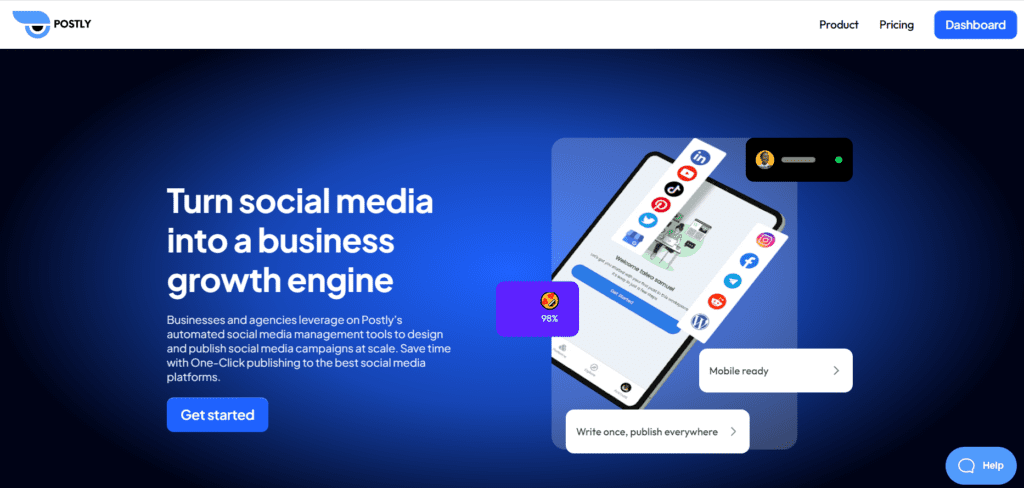

13. ‘Batching’ or Mass Creating Social Media Images
It’s possible to create a month’s worth of posts (including images!) in a few hours.
Platforms like Canva allow you to bulk upload text, images, and so on. And with a click and a few tweaks, you get multiple graphics for your social media.
14. Social media mining
This is a brand new application of AI, that too in the new field of mining data from social media.
Don’t expect to see too many tools doing this – but you should be aware of this major application of AI that covers social media and data.
SocialMiningAI detects patterns from people’s content on social media. And helps you find buyers wth high purchasing intent.
Productivity and Time management
Work more efficiently and manage your business with AI-informed data.
15. Project management
Like many other tools, AI is coming to project management too. However, it’s in the development stage.
Here are some interesting AI project management tools and functions you should know about:
- Asana Intelligence figures out future requirements and performance based on historical work. It also tells you about bottlenecks, bugs, and makes staffing recommendations.
- Create automated workflows
- Include a writing assistant with your project management software
- ClickUp AI acts like a ‘personal genie’ and does many things: summarize notes and updates, improve decision making, optimize resource assignment, estimate project costs, and so on
- Process.st is at the forefront of automated workflows. It integrates with many other tools and automates repetitive tasks. Share knowledge and get insights from data.
Want to make project management more effective? Use an AI-based tool to streamline everything.
16. Employee Productivity and Time Tracking
With remote working comes the need to track remote employees’ work.
And AI can help ensure that your team is using their time well. An AI activity tracking software or productivity or employee monitoring software will help:
- Control data theft
- Get analytics
- Prevent fraud
- Identify areas where time is wasted
- Track sites visited, software used, and so on
- Take screenshots
- Track billable hours
AI will help fill timesheets accurately, identify time wasted, and provide you with useful reports to improve employee productivity.
Tools that manage employee time and productivity include: Hubstaff, Timely, Monitask, Clockk, and many others are great examples of time-tracking software using AI.
17. AI Data Scraping and Data Mining
Data mining and data scraping are important activities for many businesses.
And they are often outsourced as cheaply as possible and are time-consuming and tedious. But with AI, these processes are much more efficient and reliable.
AI data scraping tools will allow you to extract information from various online sources. And AI data mining will identify useful information from vast quantities of data.
Such AI tools will help marketers get accurate data on consumers to target them more effectively and get greater ROI from their campaigns.
Your customer representatives will use such AI data scraping and mining tools to serve customers. And sales teams will find leads and drive more sales, and so on.
Here are tools to check out:
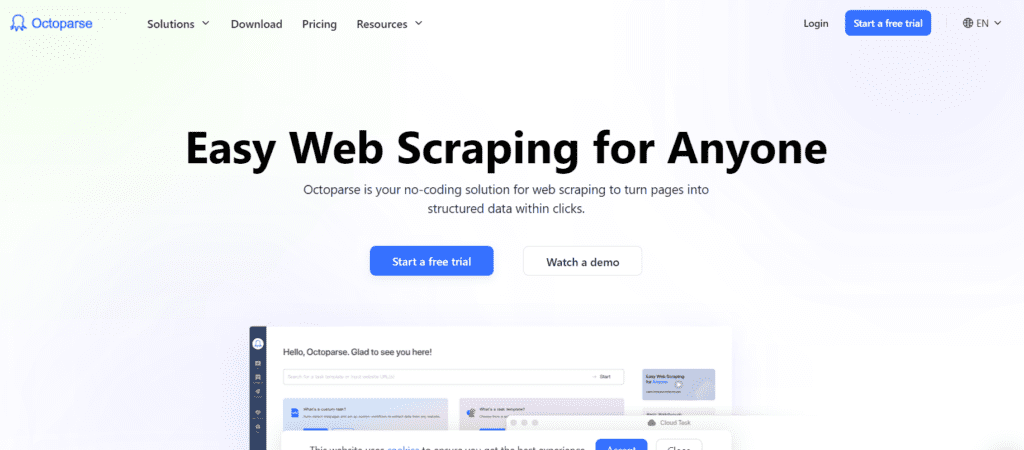

18. Automated workflow processes
AI-driven tools can help streamline business processes without human intervention.
Many businesses, especially large ones, have thousands of processes across roles, departments, and teams.
Streamlining these workflows is tedious and overwhelming, but if done correctly, can transform businesses.
AI can help with workflow and process optimization. One company to watch out for is Celonis, which does ‘process mining’ to figure out the best ways to streamline workflows.
Other AI B2B process solutions are Automation Anywhere and UiPath, and many others.
19. Translations
One of the most effective ways to grow your market share and drive up sales is to translate your website and product text into other languages.
Working with human translators can be slow and expensive. But thanks to modern AI technology, you can now get quick and accurate translations at low costs. This will enable you to reach out to people around the world and make your products and services available to them faster and more easily.
You want to use qualified human translators to check such work and ensure quality while leveraging such tools. Check out the best AI translation tools:
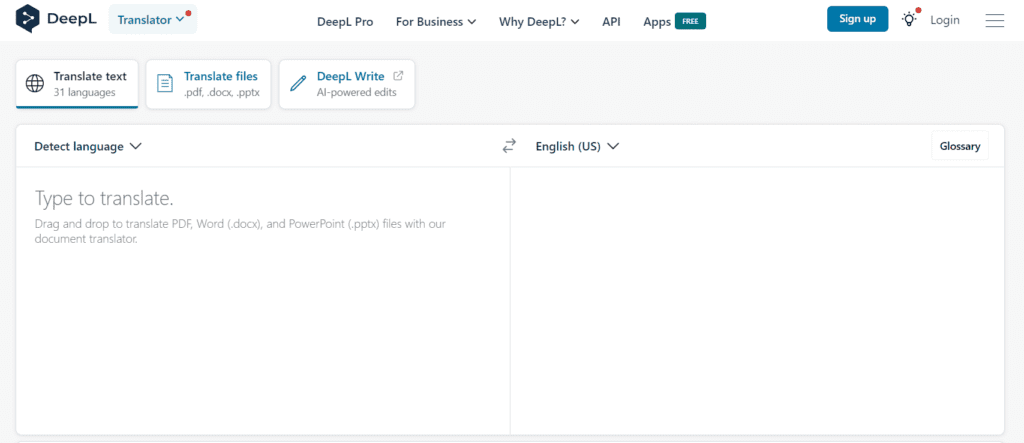

- DeepL Translate
- Smartcat
- Google Translate
- QuillBot AI – check out by QuillBot review here
- Smartling
Human Resources Activities
Here are specific ways AI can help with HR activities.
20. Skill testing
Testing a large pool of candidates for technical skills, software knowledge, and soft skills is time-consuming but critical.
Comparing different candidates’ work, identifying the best, and analyzing their strengths is a field of its own.
You’re best served by allowing AI-supported skills assessment platforms to do this for you. AI-based tools will help identify the top candidates you should hire for your business.
Some platforms that do this are Workello, Vervoe, Harver, and many others.
21. Recruitment
Here’s how you can leverage AI for better recruitment:
- AI recruitment tools will predict your hiring needs and recruitment patterns for the future
- Reduce bias during recruitment
- Use screening tools to shortlist candidates from a wide pool
- Improve the Applicant Tracking System (ATS)
- Do better recruitment marketing to attract top candidates
- Use recruitment chatbots to engage candidates
- AI interview scheduling
- Predict performance for future potential, and so on
Some platforms offering these tools are Cutshort, Zoho Recruitment, Ideal, and so on.
Customer Support
Here are ways that AI is specifically supporting better customer support.
22. AI-powered Help Desk Platforms
AI is getting integrated with helpdesk tools to:
- Summarize long email threads
- Offer replies or resolutions
- Boost productivity
- Improve happiness scores
- Identify relevant content, comments, and posts on social media
- Generate analytics with the most useful information
Some tools for AI help desks you should look at are: Help Scout, Freshdesk by Freshworks, Aisera, Atera, and others.
23. Chatbots
Chatbots are critical for lead generation. A chat tool on your site allows your site visitors to ask questions in real-time. You can engage them and clear doubts and problems right away.
They’re also powerful for carrying out automated customer support tasks especially when the queries people have are easily solved by extracting the right information from a database.
You can easily add a reliable chatbot tool to your site and remove obstacles to your user’s path. You’ll convert more people into leads and get more sales.
The best AI chatbot tools for customer support include Einstein, Freddy AI, Ultimate, Zowie, and more.
Branding
Branding combines activities like visual, text, and voice recognition in order to create an identity for a business.
Content creation and editing tools can be used for branding. But there are other tools to check out too.
24. Business Name Generator
AI-based business name generators can help you find a unique and creative name for your business. It takes into account keywords related to the industry, language preferences, and more to generate a list of possible names.
Companies like Namelix and BrandBucket use AI algorithms to generate the best name for your business.
25. Logo Design
Creating an attractive and memorable logo for your business is critical to its branding success.
AI-powered logo design tools like Logomaker use algorithms to generate logos based on the organization’s values, industry, colors, and more. This can help you create an attractive and unique logo that stands out from the crowd.
26. Personal Branding
Now AI is here to help you with personal branding. Using the right AI tools, you can become a thought leader effortlessly. And not just that, you can get reports and analytics to fine-tune your personal branding activities.
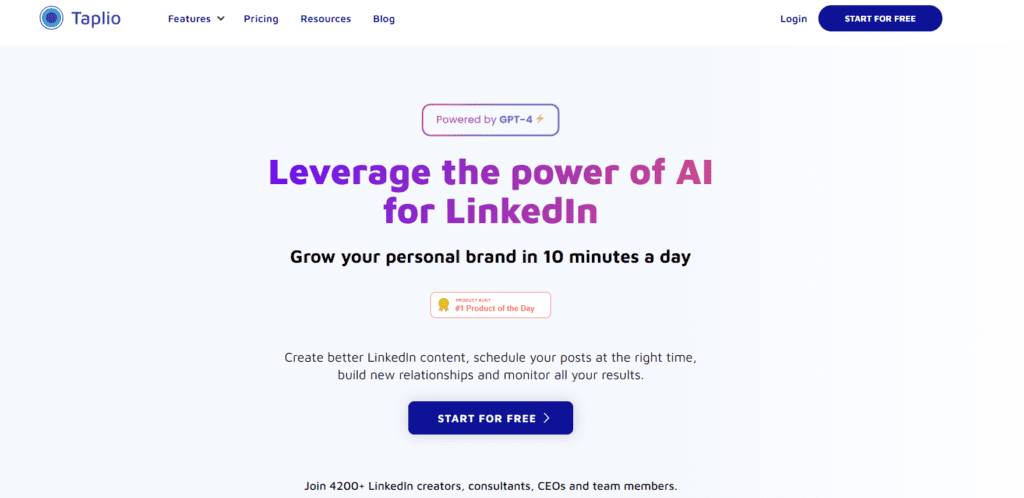

For example, take Taplio. This is incredible tool for branding yourself on LinkedIn. You can create a week’s worth of content in half an hour, schedule them at optimal times, and get ideas for graphics.
What’s best is that Taplio is geared to win on LinkedIn. You won’t get generic content generation like you would on ChatGPT.
In this way, you can build your personal brand on a consistent basis with little effort.
Conversion Optimization
The bottom line for success is sales. Other metrics, like getting subscribers and leads, are also critical in conversion optimization.
So, it’s essential to leverage AI to get more sales, more signups or any other activity where people need to convert. Here are the critical types of Conversion Rate Optimization (CRO) tools leveraging AI to help boost sales.
27. AI-generated Landing Page Builders
Landing pages are where people land when they click on an ad, social media post, or some other link. And the perfect landing page should be tailored to the user’s needs. AI-based solutions like Instapage enable you to create personalized and optimized landing pages without any programming knowledge.
All you have to is give information about your intent, product, and audience, and the tool will build your landing page for you. Headlime, Sitekick, Unbounce, and other platforms are great for this.
28. Smart A/B Testing
A/B testing is one of the best ways to test what works with your audience and optimize conversion rates. But it’s time-consuming and requires skill. AI-based tools like Convert can help you implement A/B testing with one click and save you time. Run A/B campaigns faster using AI with VWO, Evolv AI, OptiMonk, and more.
29. User Experience Optimization
The user experience (UX) of a website or app is critical in conversion rate optimization. And AI can be leveraged to optimize UX by gathering data from heat maps, mouse tracking data, and more.
Tools like ContentSquare can give you insights into what users are doing on a website and how they interact with it. Also use GeniusUI, Uizard, Framer AI, and others are great for bringing AI optimization to UX and UI.
30. Targeted advertising
Ads are expensive, and making sure they reach the right people at the right time is the key to making money without emptying your budget.
AI has great applications in targeted advertising. And brands like Microsoft are rolling out predictive targeting options and AI-generated insights for making better decisions.
Publica LLC focuses on using AI to optimize TV ads. And GumGum uses AI to support better contextual advertising – this means understanding a page’s content to place relevant ads without using customers’ private data.
These are just a few examples of AI in action when it comes to advertising.
31. Automated Retargeting
Retargeting or focusing on customers who’ve already seen your brand and interacted with you is a great way to get sales and leads.
But managing customer journeys is complex and needs significant personalization.
Platforms like Retarged.ai, Appier, and AdRoll are some major platforms to leverage.
32. Voice Search Optimization
Do you want to add voice search features and voice assistants to your online business?
Then you need AI to ensure that people can easily interact with your mobile app, website, or software to meet their needs.
Some tools that help with AI voice search include:
33. Image Recognition Technology
AI algorithms can be used to recognize objects and faces in images and videos with great accuracy.
This can be used to target certain customers with ads, identify visitors to a website, and more. Amazon Rekognition and Google Cloud Vision are some of the popular image recognition solutions available.
The specific use cases of image recognition tech include:
- Removing inappropriate images from your databases, e-commerce store, or any other platforms
- Automatically tagging images and videos for easy searchability
- Facial recognition to identify visitors on a website or app
- Automatically creating relevant product recommendations based on what customers are looking at in an e-commerce store
- Generating personalized ads based on facial features
34. AI Predictive Analytics
Many businesses need to forecast outcomes like sales, supply needs, financial performance, energy needs, and more.
And AI predictive analytics will make it possible to leverage data and understand what to do.
This could be preventing machines from breaking down or recruiting people at the right time for business needs.
Some AI predictive analytics tools that enable this are:
- C3 AI
- Google Cloud
- IBM Watson
- Alteryx
And more.
eCommerce
If you’re in online retail or wholesaling, then you want to know about the following ways AI can help you grow in the eCommerce space.
35. Personalization
Creating personalized journeys for customers is already a critical part of eCommerce marketing. And there are emerging AI tools to make personalization even more effective.
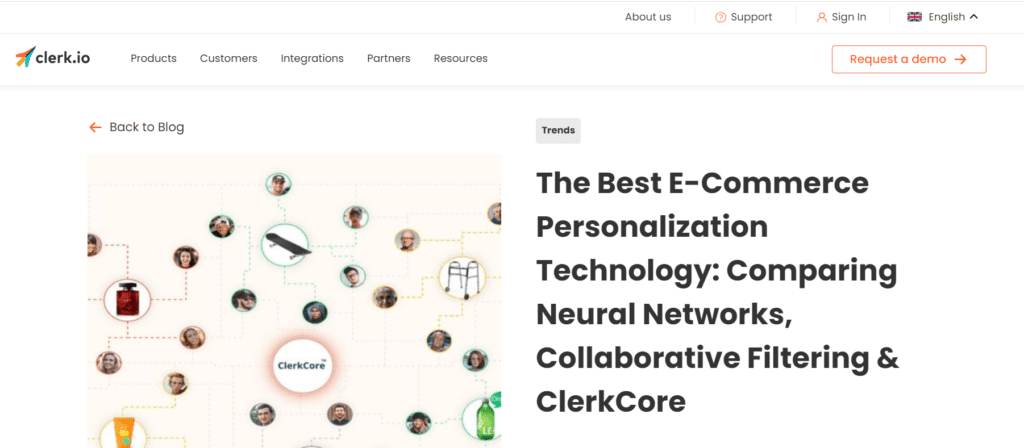

For example, ClerkCore™ by Clerk.io is one such platform.
It can help use your data and improve customer experience, learn about customer behavior, and much more.
36. Search and Discovery
Showing customers the right products and making the best recommendations is a key activity.
And AI will use AI tagging, computer vision, and related machine learning technology to tag pictures, label them, organize, and categorize them.
Some eCommerce sites have millions of product images to sort through, which makes AI an incredible help for businesses.
There are tools like Syte, Algolia, and other help with this.
37. Segmentation
eCommerce personalization is possible when you can segment customers. And this relies on data and processing it well.
AI makes it possible to manage large amounts of data and make sense of them better. It can gather data from multiple channels and use that information to segment customers appropriately.
You’ll be able to customize user journeys, send useful emails, and so on.
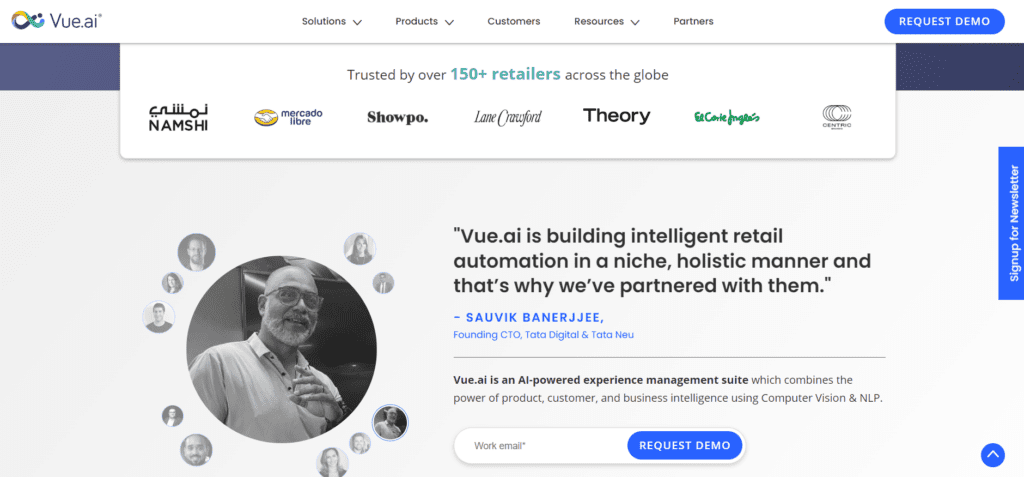

And for platforms that do all of the above – you should check out Vue.ai, Peak.ai and others which are all-in-one AI platform for eCommerce businesses.
38. User Research and Feedback
Want to gather feedback without building complex feedback tools from scratch?
Then you need an AI user feedback tool.
A powerful user feedback and research tools like 1Flow.ai will help you integrate surveys, popups, and so on with your apps easily.
39. Tool Builders – White Label GPT
One way to offer value to your audience is create simple and useful tools. You can offer them for free to generate leads or make them paid.
And thanks to AI, you don’t need to have the technical expertise or resources to build SaaS tools from scratch.
Today, there are several White Label GPT tools that makes the job easy for you. That is, you slap your brand name and colors on third-party AI tool builders. And offer them to your audience at a very low cost.
Some tools you can create with white label GPT platforms are:
- Calculators
- Lead Generation forms
- Business idea generators
- Business name generators
- Ad generators etc.
Essentially, you can create custom AI tools without any technical expertise.
Tools offering White Label include FeedHive, Forwise.AI and others.
40. AI Form Creation Tools
Whether you want to get AI to generate a complete form for you with a few prompts or to build a form tool that automatically generates responses, AI can help.
Build contact forms, surveys, personality tests, quizzes, and virtually anything you can think of with AI Form tools.
Check out my list of best AI form tools here.
Conclusion
As you can see, there are many ways businesses can leverage AI in 2024. From targeted advertising to automated customer support and more, AI is now becoming an essential part of any business’s digital strategy.
However, it is important to remember that AI-powered tools require training and testing before they’re put into use, and businesses need to invest in the right AI-powered tools for their specific needs.
So, if you are looking to stay ahead of the curve and make your business more competitive, then it is time to start leveraging AI-powered tools. With the right tool on your side, you can quickly drive growth and success for your business.

